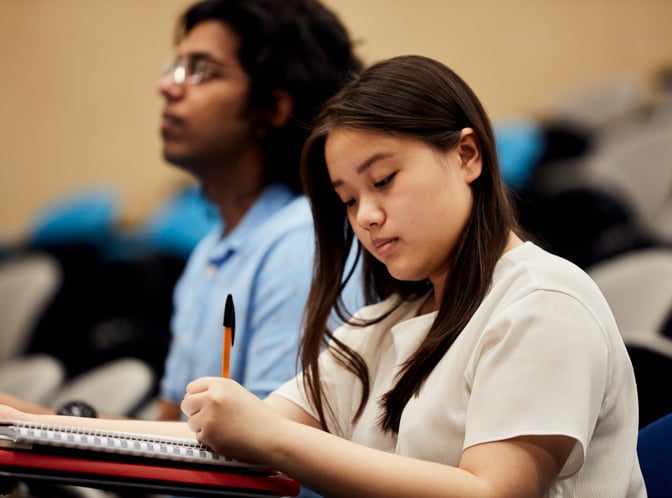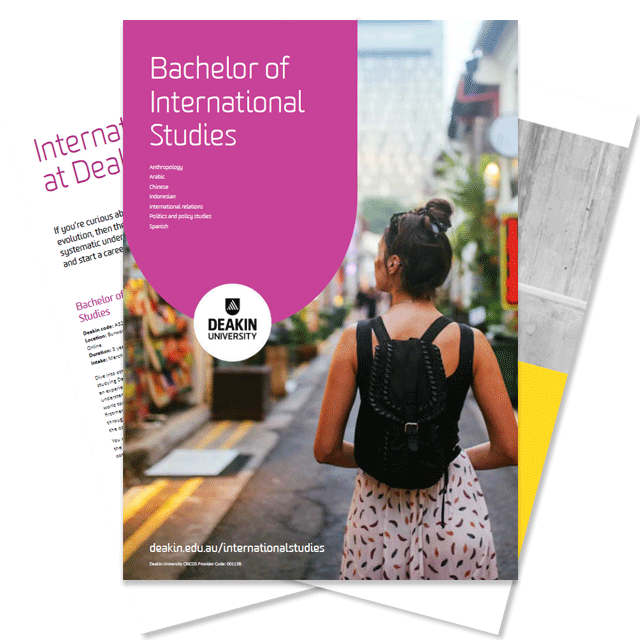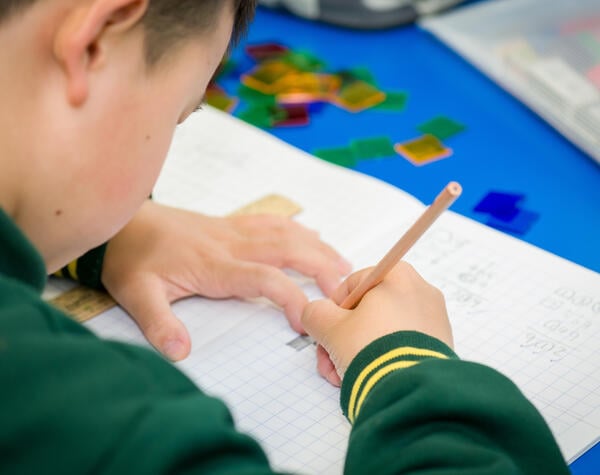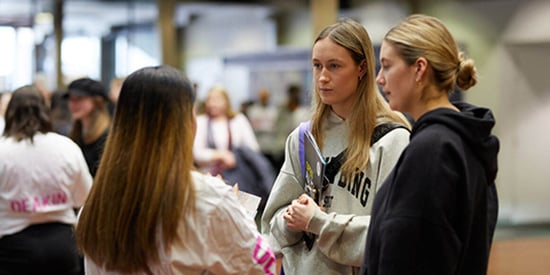Combine study and travel in a unique degree
Top 1% of universities worldwide*
Access 400+ international academic partnerships
Key facts
Key dates
Direct applications to Deakin for Trimester 2 2024 close 23 June 2024
Current Deakin Students
To access your official course details for the year you started your degree, please visit the handbook
Course overview
Develop intercultural competencies and an established global perspective by studying Deakin’s Bachelor of International Studies (Global Scholar). Designed for high-achieving students, this course will equip you with foundation knowledge of the global political climate and the forces shaping government, business and society in Australia and throughout the world. You’ll develop a professional portfolio of international experiences to build a global career from the very start of your studies.
Understand how events of the past have contributed to today’s environment and apply transversal and analytical skills to reflect on the past and tackle the future. You’ll learn what it takes to establish and maintain a professional presence as an international relations professional, as well as build a graduate portfolio that highlights the key learning outcomes you’ve acquired throughout your degree.
The relationships between countries and political powers are ever-changing. Are you ready to learn how to navigate these international environments?
Choose to major in disciplines that will offer a unique perspective to your degree such as:
- anthropology
- Arabic
- Chinese
- Indonesian
- international relations
- Middle East studies
- politics and policy studies
- Spanish.
Whether you choose to study at one of our partner universities, or complete an internship overseas, virtually, or in Australia, you will gain vital practical experience that will give you a competitive edge in the job market and make you highly valued by employers. We know travelling abroad can be an expensive experience, so we also offer scholarships to help you complete your studies overseas*.
Graduate as a global scholar from Deakin and you will be ready to step into the real world as an effective intercultural communicator with the skills to advise on policy and critically analyse international issues of past and present.
*Overseas study programs to be confirmed, subject to government travel restrictions.
Read MoreCourse information
- Award granted
- Bachelor of International Studies (Global Scholar)
- Year
2024 course information
- VTAC code
- 1400410371 - Waterfront (Geelong), Commonwealth Supported Place (HECS)
1400510371 - Burwood (Melbourne), Commonwealth Supported Place (HECS)
1400610371 - Online, Commonwealth Supported Place (HECS) - Deakin code
- A306
- CRICOS code?
- 092876G Burwood (Melbourne), Waterfront (Geelong)
- Level
- Undergraduate
- Australian Qualifications Framework (AQF) recognition
The award conferred upon completion is recognised in the Australian Qualifications Framework at Level 7.
Course structure
Student must successfully complete 24 credit points of study including:
- 6 core units
- An approved major sequence of at least 8 credit points selected from Anthropology, Arabic, Chinese, Indonesian, International Relations, Politics and Policy Studies or Spanish
- A minor sequence of at least 4 credit points in either International Relations or Languages (Arabic, Chinese, Indonesian, Spanish)
- No more than 10 credit points at level 1
- No more than 8 credit points taken outside the Faculty of Arts and Education
- A minimum of 6 credit points at level 3
- At least 4 credit points of international experience, which must include either AIS331 International Internship B (4 credit points) or AIS330 International Internship A (2 credit points), with additional credit points selected from the list of approved international experiences below:
- trimester of study at an overseas university exchange partner
- in-country language program (in Chinese, Indonesian, Arabic, or Spanish)
- approved study abroad program or approved study tour (AIS203), (AIR292*) or other
- approved onshore internship with an international organisation (available for (AIS330) only)
- 2 credit points of consecutive language units other than an in-country language program (AIB151 & AIB152; AIB251 & AIB252; AIC181 & AIC182; AIC281 & AIC282; AIC283 & AIC284; AIF146 & AIF142; AIF241 & AIF242; AIF341 & AIF342; AIF145; ALS100 & ALS150; ALS200 & ALS250) can be taken to achieve one credit point of the international experience requirement
- Completion of the Global Citizenship Program
- Academic Integrity Module DAI001 Academic Integrity Module (0-credit-point compulsory unit)
Core units
International Experience
All students must complete at least 4 credit points of international experience, which must include either AIS331 International Internship B (4 credit points) or AIS330 International Internship A (2 credit points) with additional credit points selected from the list of approved international experiences below:
- trimester of study at an overseas university exchange partner
- in-country language program (in Chinese, Indonesian, Arabic, or Spanish)
- approved study abroad program or approved study tour (AIS203, AIR292*, AIE365* or other)
- approved onshore internship with an international organisation (available for AIS330 only).
- 2 credit points of consecutive language units other than an in-country language program can be taken to achieve one credit point of the international experience requirement
Further information on international experience options and previous students' experiences is available at: Work Integrated Learning
Further information about AIS330 International Internship A and AIS331 International Internship B, including application and approval process and funding is available at: Work Integrated Learning
For further information regarding the in-country language programs, refer to the major sequences in Arabic, Chinese, Indonesian, and Spanish.
* Unit no longer available for enrolment
Major sequences
Refer to the details of each major sequence for availability.
Intakes by location
The availability of a course varies across locations and intakes. This means that a course offered in Trimester 1 may not be offered in the same location for Trimester 2 or 3. Check each intake for up-to-date information on when and where you can commence your studies.
Trimester 1 - March
- Start date: March
- Available at:
- Burwood (Melbourne)
- Waterfront (Geelong)
- Online
Trimester 2 - July
- Start date: July
- Available at:
- Burwood (Melbourne)
- Waterfront (Geelong)
- Online
Deakin splits the academic year into three terms, known as trimesters. Most students usually undertake two trimesters each year (March-June, July-November).
Additional course information
Course duration
Course duration may be affected by delays in completing course requirements, such as accessing or completing work placements.
Mandatory student checks
Any unit which contains work integrated learning, a community placement or interaction with the community may require a police check, Working with Children Check or other check.
Participation requirements
Elective units may be selected that include work-based training or community-based learning. Placement can occur at any time, including during standard holiday breaks. Learn about key dates at Deakin.
Reasonable adjustments to participation and other course requirements will be made for students with a disability. More information available at Disability support services.
Work experience
Elective units may provide the opportunity for Work Integrated Learning experiences.
Need help?
Ask a question about studying at Deakin
Entry requirements
Selection is based on a holistic consideration of your academic merit, work experience, likelihood of success, availability of places, participation requirements, regulatory requirements, and individual circumstances. You will need to meet the minimum academic and English language proficiency requirements to be considered for selection, but this does not guarantee admission.
Academic requirements
Current or recent secondary education
If you're currently studying Year 12, or completed Year 12 in the last two years, you will need to meet all of the following criteria to be considered for admission to this degree:
Year 12 prerequisite subjects
- Units 3 and 4: a study score of at least 25 in English EAL (English as an Additional Language) or at least 20 in English other than EAL
ATAR
This course uses the ATAR as part of its selection considerations, and has a minimum ATAR requirement of 80 including selection adjustments.
Higher education
If you have undertaken higher education studies after secondary schooling, you will need to meet all the following criteria to be considered for admission to this degree:
- successful completion of at least two bachelor level or above units (AQF Level 7 or equivalent)
Vocational education
This course does not accept VET study for entry, please check for alternative entry requirements or visit the pathways finder for alternate pathways into this course
Work and life experience
This course does not accept work, volunteer and/or life experience for entry. Please check for alternative entry requirements or visit the pathways finder for alternate pathways into this course
English language proficiency requirements
To meet the English language proficiency requirements of this course, you will need to demonstrate at least one of the following:
- Victorian Certificate of Education (VCE) English Units 3 and 4: Study score of 25 in English as an Additional Language (EAL) or 20 in any other English
- IELTS overall score of 6.0 (with no band score less than 6.0) or equivalent
- other evidence of English language proficiency (learn more about other ways to satisfy the requirements)
Selection adjustments
Subject adjustment
A study score of 30 in any English, any History, any LOTE, Australian Politics or Global Politics equals 2 aggregate points per study. Overall maximum of 12 points.
Access and equity
Special entry access schemes (SEAS) enable Deakin to consider disadvantaged circumstances you may have experienced and the impact upon your studies. SEAS also allows us to identify if you’re from under-represented groups when making selection decisions for some courses. SEAS does not exempt you from meeting any of the course entry requirements. Learn more about Deakin’s special entry access schemes.
Admissions information
Learn more about Deakin courses and how we compare to other universities when it comes to the quality of our teaching and learning. We're also committed to admissions transparency. Read about our first intake of 2023 students (PDF, 354KB) – their average ATARs, whether they had any previous higher education experience and more.
Not sure if you can get into Deakin? Discover the different entry pathways we offer and study options available to you, no matter your ATAR or education history.
Recognition of prior learning
The University aims to provide students with as much credit as possible for approved prior study or informal learning which exceeds the normal entrance requirements for the course and is within the constraints of the course regulations. Students are required to complete a minimum of one-third of the course at Deakin University, or four credit points, whichever is the greater. In the case of certificates, including graduate certificates, a minimum of two credit points within the course must be completed at Deakin.
You can also refer to the Recognition of prior learning system which outlines the credit that may be granted towards a Deakin University degree and how to apply for credit.
Fees and scholarships
Fee information
Learn more about fees.
The tuition fees you pay will depend on the units you choose to study as each unit has its own costs. The 'Estimated tuition fee' is provided as a guide only based on a typical enrolment of students undertaking the first year of this course. The cost will vary depending on the units you choose, your study load, the time it takes to complete your course and any approved Recognition of prior learning you have. Each unit you enrol in has a credit point value.
The 'Estimated tuition fee' is calculated by adding together 8 credit points of a typical combination of units for that course. Eight credit points is used as it represents a typical full-time enrolment load for a year. You can find the credit point value of each unit under the Unit Description by searching for the unit in the Handbook. Learn more about fees and available payment options on our Current students fees website.
Scholarship options
A Deakin scholarship could help you pay for your course fees, living costs and study materials. If you've got something special to offer Deakin - or maybe you just need a bit of extra support - we've got a scholarship opportunity for you. Search or browse through our scholarships
Apply now
Applications for Trimester 1, 2025 open in August. Each year, thousands of students prepare for uni with the help of Deakin support services. We offer a huge range of support, including one-on-one consultations, webinars, online resources and events throughout the year.
Some of our courses have limited places available - for the latest on courses still open for application, visit Courses by trimester.
Create an account in the Deakin Application Portal, start your application, enter personal details, education experience, upload supporting documents and submit. Need help? Play this video, or contact one of our friendly future student advisers on 1800 693 888 or submit an online enquiry.
Entry pathways
View pathways into the Bachelor of International Studies (Global Scholar) with our pathways finder.
Alternative exits
- Bachelor of International Studies (A326)
- Diploma of Arts (A215)
Contact information
Our friendly advisers are available to speak to you one-on-one about your study options, support services and how we can help you further your career.
- Call us: 1800 693 888 Mon–Fri, 9am–5pm
- Live Chat: Mon–Thurs, 8am–7pm, Fri 8am–5pm
- Submit an online enquiry
- Help hub find common and trending questions and answers
Careers
Want a degree that’s more than just a qualification? Our industry connections, world-class facilities and practical approach to learning are just some of the reasons why Deakin students graduate confident and ready to thrive in the jobs of tomorrow.
Career outcomes
Graduating from this course prepares you with the analytical skills and international experience to apply your knowledge to a range of roles. Build your career in Australia or overseas working in roles including:
- foreign correspondent
- foreign exchange analyst
- human rights advocate
- immigration agent
- international aid officer
- international management consultant
- international trade law consultant
- law reform officer
- political journalist
- trade agreements negotiator
- trade delegate.
For more information go to DeakinTALENT
Course learning outcomes
Deakin's graduate learning outcomes describe the knowledge and capabilities graduates can demonstrate at the completion of their course. These outcomes mean that regardless of the Deakin course you undertake, you can rest assured your degree will teach you the skills and professional attributes that employers value. They'll set you up to learn and work effectively in the future.
| Deakin Graduate Learning Outcomes | Course Learning Outcomes |
| Discipline-specific knowledge and capabilities | Review, analyse and apply key concepts in International Studies, relating to international politics and society, globalisation and development, intercultural competency, global citizenship and professional development. Develop disciplinary perspectives and appropriate theories and technical knowledge with reference to one or more Social Science, including through the study of languages or International Relations. |
| Communication | Apply learnings from personal and professional development in diverse organizational contexts to effectively communicate cross-cultural ideas, arguments and analyses to diverse audiences using a range of different mediums. |
| Digital literacy | Employ a range of digital technologies and platforms appropriately to conduct research, engage in discussion and debate, document personal and professional skills and attributes, communicate effectively with and deliver reports and presentations to a diverse range of audiences within and outside the field of International Studies. |
| Critical thinking | Analyse and critically evaluate conceptual and theoretical approaches to issues of international politics and society, intercultural competency, global citizenship, and professional development in the context of an increasingly complex globalized world that requires appreciation of local, national, regional and international dynamics and their interactions. |
| Problem solving | Employ initiative and creativity in conjunction with appropriate Social Science methods of research and analysis to systematically investigate and generate context-sensitive and pragmatic solutions to complex real-world problems. |
| Self-management | Exercise autonomy, responsibility, accountability and a sustained and ongoing commitment to learning and skill development in International Studies contexts including but not limited to communities of practice and scholarship. |
| Teamwork | Work and learn collaboratively and productively with others in the field of International Studies and with stakeholders from other disciplines and backgrounds to achieve shared goals. |
| Global citizenship | Analyse and respond appropriately to issues of cultural, social and political inequity, and to the transferability of knowledge and skills in a range of geographic, knowledge and organisational contexts as a reflective scholar and practitioner. Through sustained participation in international experiences, develop practical skills to critically engage with and consider cultural and socio-economic diversity, social and environmental responsibility and adherence to professional and academic ethical standards. |
| Approved by Faculty Board November 2020 | |
Events Explore more events
Footnotes
*ARWU Rankings 2022
^Year on year, our undergraduate students are the most-satisfied students of all Victorian universities. Australian Graduate Survey 2010–2015, Graduate Outcomes Survey 2016–2019 (GOS), Quality Indicators for Learning and Teaching (QILT).
#QS Stars University Ratings 2016–2017





